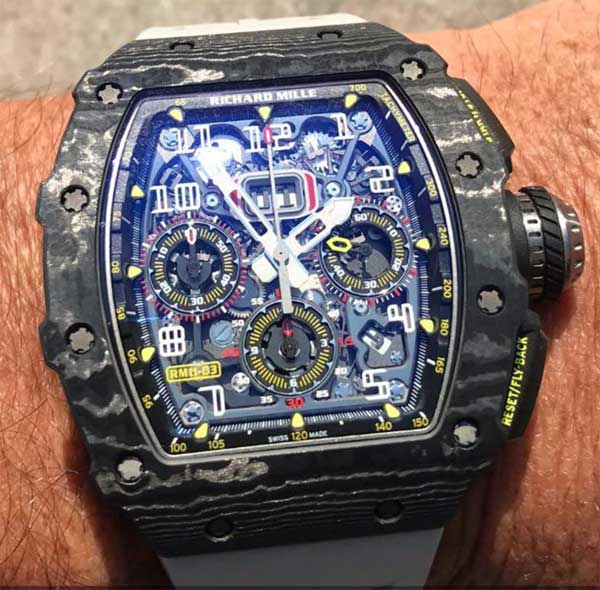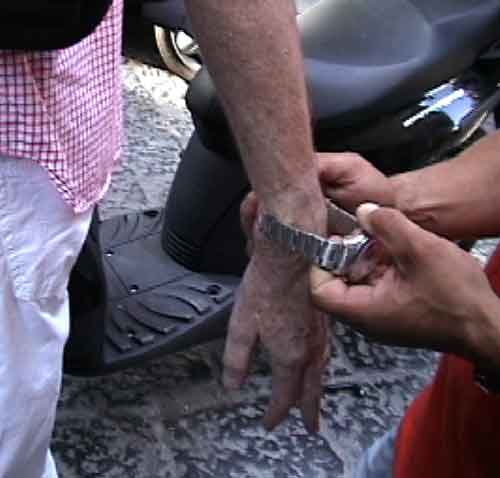Watch-theft in Stockholm is drastically increasing. Most seem to be targeted and well-planned. Social media may be a research tool for the thieves.
Continue readingHow a stolen credit card number makes cash for a fraudster

All this talk of stolen credit cards and “skimming.” Then what? What happens after you’ve swiped your card through a tampered-with ATM, gas pump, or bank entry door?
A kid, a computer, and a clever scam that games the system—that’s all it takes to make big bucks, without leaving home. For credit card fraudsters like the teenager who calls himself “d0g,” it’s simply online shopping. He doesn’t handle merchandise, cash checks, or visit drop spots. His butt never leaves his chair, his fingers never leave his keyboard, his eyes never leave his screen.
How fraud with a stolen credit card works
It’s all about shopping, according to Patrick Lambert, who poked around the underground “carder sites” that sell the information from stolen credit cards. Buy one for a few dollars and just go shopping! Well… not quite.
What’s a credit card fraudster to do: buy expensive goods online and have them shipped to his home? Certainly not. In his Interview with a malicious hacker making over $10,000 a week, [Edit 7/8/13: Lambert has taken down his fascinating and instructive article.] Lambert reports how easy it is to find and use these carder sites, and how to turn the hot credit card into hard cash:
So finally, the last question I had was how they manage to get actual, physical goods using that stolen credit card, without having to divulge their address. The way I was explained is that all he has to do is post ads on eBay for popular items that he doesn’t actually have. Then, when someone buys it, he turns around and buys that same item from some online store with the bought CC numbers, and puts the eBay buyer’s address as the shipping location. He makes those stores send the products directly to his buyers, and gets clean cash for them, which he can spend any way he wants. It’s a type of online money laundering. And apparently, the reason why these stolen numbers are sold so cheaply is because a vast majority of them are either already canceled, or maxed out.
Now I’m wondering about the wide-format pro printer I sold on Craig’s List: did I unwittingly sell it to an ID thief and obediently ship it to the innocent third party who supplied the thief with clean money? It could have worked that way, at least if I were a store that accepted credit card payments. In my case, I was paid via PayPal, and the funds cleared. Can a thief fund PayPal with a stolen credit card? I’m not sure…
You can see how this three-way scam works. An innocent and unsuspecting buyer of goods provides clean money in return for real items, and is none the wiser. A merchant sells items and is paid with a stolen credit card. d0g sits in the middle pulling strings and catching the money. Easy!
There’s much more to it though, Lambert learned from d0g. “Doing the crime, getting rich with stolen identities, is really easy. The hard part is covering your tracks, and 90% of the things these people do are for the sole purpose of covering themselves.”
That would include subscribing to a VPN (a secure and anonymous web tunnel), and funding an anonymous online payment system.
This sort of “hacking” (which is not what I would call it) can be done on a large or very small scale, but either way, easily, and causing serious financial damage. If it’s true that one credit card fraudster (like d0g, the teenager) can net over $10,000 a week with a low risk of getting caught, it’s clear that the vocation would attract legions of practitioners. It’s clear, too, that our payment system needs fixing.
* * *
12/22/15 Note to HACKERS: I appreciate when you contribute additional knowledge in the hundreds of comments below, but please realize that this post will not function as a message board for contacting each other. Check it out: all email addresses in the comments below have been deleted. This is done by a human (me), not a robot. So please save yourself (and me) the trouble. Do comment on credit card hacking, but don’t look for business here. Thanks —BV
Later note: Alas, I had to close comments on this post due to soliciting. However, there’s really interesting stuff below. Thanks for all the contributions!
Even later note: Looks like skimmers’ days may be numbered, thanks to the Skim Reaper, a credit card-sized detection device that we can dip into an ATM or POS before using it to determine its safety. Well, we won’t be using it any time soon, at a cost of almost $500, but let’s say maybe bank branch managers will check their machines periodically, and police can check random ATMs.

Watch-stealing
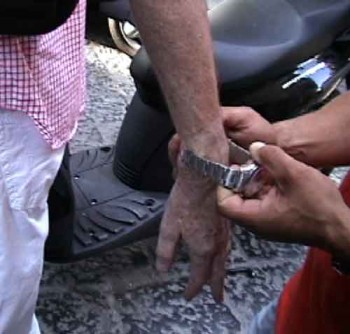
Wristwatches are a classic subject of seizure. The problem is not widespread, but concentrated largely in specific locales. Naples, Italy, is only one of them.
José, a day visitor there, stopped on Via Toledo to photograph a colorful produce stand. As he walked away with his wife, his Rolex was snatched from his wrist. He turned in time to see a teenage boy running up into the narrow alleys of Quartieri Spagnoli, bystanders watching with no apparent concern.
A cruise ship captain had his Rolex ripped off from the perceived safety of a taxi stopped in traffic, as he rested his arm on the open window. And a grocer we met, a Napolitano, said the motorcycle bandits, scippatori, had tried to grab his Rolex four times, and finally succeeded. He had a new one now, but showed us the cheap watch he switched to before leaving his store every day with the Rolex in his pocket.
In Caracas, 17 members of an organized tour paused in a square to view a statue of Bolivar. While the tour guide lectured, a pair of men in business suits jumped a Japanese couple who stood at the back of the group. They were wrestled to the ground, their Rolexes pried off their wrists, and the well-dressed thieves on their escape before anyone could spring into action.
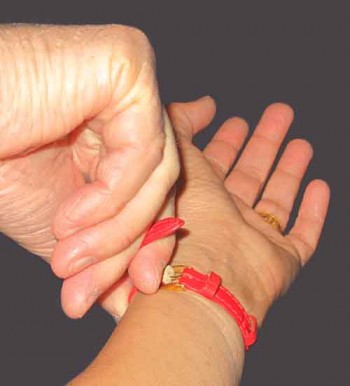
After watching my husband, Bob Arno, demonstrate watch steals in his show, people come up to us with wrists outstretched. “But they couldn’t get this one, could they? It’s even hard for me to unclasp.”
Watch-stealing
Bob’s theatrical techniques are totally unlike the street thieves’ methods. Bob’s stage steals are designed to climax with the surprise return of an intact watch. The thief, on the other hand, cares not if the victim notices or if the watch breaks. In the street, a watch thief gets his quick fingers under the face of the watch and pulls with a twist, snapping the tiny pins that connect the watch to its strap.
The readily recognizable Rolex is a universal symbol of wealth. Its instant ID factor makes it not only a conspicuous target, but highly desirable on the second-hand market. Even a fraction of its “hot” price brings big bucks to the thief and the fence.
Outside of Naples, in South Africa, Brazil, and England for example, seizure of Rolex watches is big business often perpetrated by Nigerian gangs, who send shipments of these status symbols to eager dealers in the Middle East. Who would guess that watch-snatching was so organized, so global?
Excerpt from Travel Advisory: How to Avoid Thefts, Cons, and Street Scams
Chapter Five: Rip-Offs: Introducing…the Opportunist
Read How to Steal a Rolex
Pickpockets in Durban, South Africa

“We do what you do,” Bob told the poker-faced pickpocket. “Same job.”
Looking at his blank expression, it wasn’t clear that he understood. Perhaps he didn’t speak English. If he did understand, his mind must have been racing. What could be worse for a pickpocket than being confronted by a stranger? Even one who claims to be a colleague.
“Here, I’ll show you.” Bob put his hand on the young man’s shoulder, dipped into the man’s pants pocket, and extracted a woman’s wallet—the same one we’d just watched—and filmed—the pickpocket snag from someone’s handbag.
Bob opened the wallet. There was no money in it. The pickpocket watched in stunned silence as Bob turned away with it.
“Excuse me, madam. Is this yours?” Bob offered the empty wallet to the victim who still stood just a few yards away, engaged in the spectacle she’d come to witness. The woman accepted the wallet gratefully, but puzzled. She hadn’t realized it was missing.
“You see?” Bob asked, returning to the pickpocket. “Same job. You understand?”
“I understand.” the young man said. Clearly, he didn’t know what was coming. Best to say little, he seemed to think. Speak only when questioned.
It was our first visit to Durban in many years. The climate had changed drastically since the abolishment of apartheid and the switch in governments. Violent crime in South Africa was frighteningly high now, to the extent that the U.S. State Department, as well as Britain’s and Australia’s governments, recommended that business travelers to the country employ armed bodyguards.
Visitors were warned to stay in their hotels after dark and use extreme caution at all times.
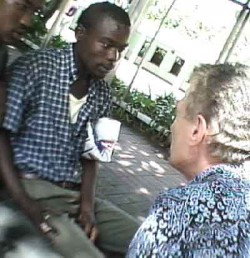
It was a warm spring Sunday when Bob and I landed in Durban’s city center. We had intended to wander through the outdoor market when our attention was drawn to a huge crowd on the edge of Central Park. Though we couldn’t see beyond the spectators, roaring engines soon informed us that they were watching car races. We hung back a bit and studied the rapt audience.
“Watch those three,” Bob said, and I followed his eyes. “Watch their body language.”
Within two minutes of our arrival, our eyes were fixed on a trio of suspicious characters. These three did not strain to look over or between the heads of the crowd. They seemed to be as interested in car races as Bob and I were. Instead, they looked at the backs of the spectators. They lingered and loitered a few minutes, then moved on and looked for new opportunities among new backsides.
Engines roared and tires squealed. Loudspeakers blared some exciting results. One of the young men had a plastic shopping bag in his hand; as in fact, many people did. But his bag was folded flat in half twice, which gave it a bit of firmness. It could have contained a greeting card, or a small pad of paper. On closer inspection, I noticed the red advertising copy printed on the bag was worn off to the point of illegibility. The folded bag must have been held in a sweaty grip for hours.
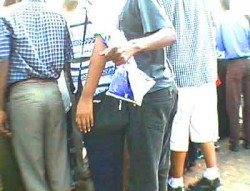
The three men positioned themselves around a woman whose purse stuck out behind her. One man moved in on each side of the woman, blocking her purse from the views of anyone to her sides. The third man slowly crowded into the woman from behind, stretching his neck as if trying to watch the race. Slowly, slowly, his left hand raised the flattened bag to the purse, where his right hand crept up to meet it. Then, with the plastic bag as a shield and his right hand poised above the purse, he gave the woman a little jostle. A gentle, natural jostle, appropriate for a tightly crowded audience engrossed in vicarious thrills. His skinny elbow raised and lowered then, and Bob and I caught a quick glimpse of brown leather before it was folded into the flattened bag and plunged into the thief’s deep pants pocket.
Excerpt from Travel Advisory: How to Avoid Thefts, Cons, and Street Scams
Chapter Five: Rip-offs: Introducing… The Opportunist
Mugged in Mumbai—and an unexpected Karmic twist

“I WANT,” is the driving force behind mugging: need and greed. But these muggers in India also had intangible desires that compelled them to behave in a way that surprised their victim. After a recent visit to Mumbai, my friend Paul McFarland, a cruise director, filed his report.
Thanking Muggers
After years of travel there are a few places that I still get excited to visit. Mumbai, India is one of them.
After a delicious meal at the Khyber restaurant, I waited for a taxi outside. I planned to go to Victoria Station, the train station in downtown Mumbai, to take photos of the beautiful building and the colorful people.
A black and yellow taxi pulled up, reminding me of a bumblebee; not so much because of the color but because of its size. It took me some time to fold my 6′ 3″ frame into the back of the vintage vehicle, and I was no sooner in when the driver hastily sped off. We quickly reached top speed and began cutting and slashing through the traffic. I felt like a bag of rice being thrown from side to side. Fortunately my outstretched arms could reach each side of the vehicle and that alone kept me upright.
The driver sensed my discomfort and asked if I liked Indian music—as if that would soothe me. I didn’t want to set him off by saying no, so I nodded. Big mistake. His voice sounded like a snake charmer’s flute as he sang, and he let go of the steering wheel, wildly waving his arms as if he were a classical dancer. All the while he was driving faster and faster, narrowly missing ox carts, cars, and pedestrians. I finally screamed at him to slow down, whereupon he glanced at me in disbelief and started to sing his song slower. The good news is that I arrived at Victoria Station in record time. Little did I know this was just the start of my adventure.
I got out of the taxi much quicker than I got in—so happy I had arrived safely that I gladly overpaid him by 200 rupees. I had plenty of money with me as I planned on giving a few rupees to some of the people as a thank you for allowing me to take their pictures.
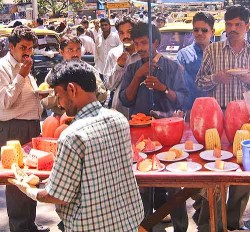
Victoria Station loomed large across the busy intersection and beckoned to me to photograph its architectural beauty.
On the way I stopped every few feet to photograph the colorful, happy people at the markets that had sprung up on the streets surrounding the station. They were selling everything: from watermelon with slices of fresh pineapple chilled with melting blocks of ice, to scraps of material, to cheap padlocks. Because my camera was new I was concentrating on the viewfinder, focused solely on my photography. I wandered freely throughout the crowded market and, even though I was by myself, I felt very safe. I’ve enjoyed many wonderful visits to this exotic and exciting country without any incidents and had no reason to believe today would be any different.
Even though I didn’t buy anything, the street vendors seemed to enjoy having me look at their items. I think it added some credibility to their card-table stores. I weaved my way through the vendors and crossed the street to capture a good panoramic view of Victoria Station. As I walked along a roadside barrier, I kept my eye on the building.
Mugged in Mumbai
I didn’t notice a taxi approach me from the opposite direction. It pulled to a stop right next to me and two young men got out. At the same time someone tapped me on my shoulder. As I turned to see who it was, the two men from the taxi immediately dropped down in front of me, grabbing and wrapping themselves around each leg.
My first thought was, my God these beggars are a lot more aggressive than they used to be; but at the same time two men jumped on my back, one holding onto my left arm and the other one going for my backpack which contained more camera equipment. Another one wrapped his arms around my waist. I must be watching too much of the Discovery Channel because I remember thinking: I’m like a wildebeest on the Serengeti being pulled down by a pack of jackals. Even though the wildebeest is much stronger, the jackals can bring him down through perseverance.
I staggered forward wearing five young men. Then it occurred to me that they weren’t trying to hurt me, they were just trying to detain me long enough to pick my pockets. Within seconds I reached for my wallet but it was it was already gone. This enraged me and I tossed two of the young men to the ground. But I noticed at the same time that one of the boys was running from the scene dodging traffic as quickly as his flip-flops would allow. His hasty departure told me he was the one with my wallet.
I tried to pursue him, but there were still three thugs hanging onto my legs and waist. I was able to quickly rid myself of the young man around my waist but I had to use my camera as a hammer to get rid of the human leg irons. They were no match for the Nikon D300 and dropped off. Then I was free to pursue the thief with my wallet.
I ran across the four lanes of traffic yelling stop thief at the top of my lungs, hoping to gain attention and support from the many locals in the area. But he had already made it to the other side of the road and had merged with the millions of Indians at the Sunday market. My heart sank, knowing that my chances of ever seeing him or my wallet again were nil.
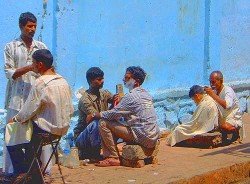
I wandered through the market, carefully scrutinizing every face I saw. After about ten minutes, realizing my search was futile, I headed back to the road. I now looked suspiciously at the same people, and now their beauty and innocence were gone. I was sad about that. Little did I know that there was still more to my adventure.
The black and yellow bumblebee taxis were all lined up looking for fares, but not necessarily looking for me because, in this part of town, few of the drivers spoke English. In these situations, rather than asking drivers if they speak English I ask “Did it snow last night?” if they say “yes, no problem,” I know we’d have a problem if I got in that taxi.
After quizzing eight to ten drivers, I found one I thought understood my destination. I was relieved that I had remembered before leaving the ship to stash some cash in other pockets in case of just such an emergency. I climbed into the taxi and he took off in the direction of my ship, giving me confidence that I had made the right choice.
We’d been on the road for three or four minutes, giving me time to organize my thoughts and do a mental inventory of what was in my wallet and what steps I was going to have to take when I got back to the ship. I realized that the wallet contained three credit cards, my drivers license, my PADI dive card I’d had since 1976, and $250 cash.
My concentration was interrupted when suddenly another taxi pulled up next to us with two young men in the back seat yelling at my driver. My driver tried to ignore them at first, but eventually was forced to the side of the road by the other taxi. I couldn’t believe it was happening again, and I braced myself for another attack. I thought: the bastards know I have more money because I got in a taxi and they’re after every penny.
I gripped my Nikon for action as the two young men jumped out and quickly threw something in the back window that landed on my lap. Thinking the worst, I threw myself out of its path—only to discover that it was my wallet. To say I was surprised to see it is an understatement. I opened it and realized that my credit cards and everything but my money was intact.
As they fled, I was so relieved, I blurted out the window, “thank you,” as if they were India’s version of Robin Hood. I thought: you’ve really lost it now—thanking muggers! My taxi driver smiled at me, and we once again took off for the port. On the ride I double and triple check my wallet, thinking it was too good to be true to have thieves go to the effort to track me down. Why had they chosen me to attack, and then why in the world would they take the chance of being caught by returning it?
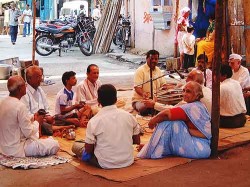
I wasn’t sure if my driver knew that I’d been mugged when I got in the taxi, but I was pretty sure he figured it out. So I asked him why they returned my wallet and he gave me in a one-word reply: Karma. I remembered reading that in the Hindu and Buddhist religions Karma is most important and is based on actions or deeds. The thieves initially created very bad Karma for themselves, but by returning my wallet perhaps they hoped to balance it out with a good deed.
Once back at the port I told the ship’s agent about the incident and he asked me to describe the attackers. I told him that there were six or seven of them, and that they were all about 5′ 6″ to 5′ 7″ with dark hair and dark complexions. I added what I thought would be a helpful detail, remembering that they all wore flip-flops. He seemed amused, and I embarrassingly realized that I had just described not only my attackers, but probably five million other young men in the city. I quickly added that one of them might have a unique imprint on his forehead—that of a 28 x 200mm Nikon lens.
Bottom line: I lost $250 but that’s not what I’ll miss the most. I’ll miss feeling safe in a city I still love.
*The photos of Mumbai are mine. Paul’s are probably much better!
For more on muggers, read
“How I mug,” as told by two muggers in Panama
Oktoberfest: Breasts, big beers, and Bavarian barf

Called in to pickpocket goodies from the massive Munich Oktoberfest crowd, Bob and I, just back from Japan to do a show for Monsanto in Las Vegas, raced to catch the last two days of the bawdy Bavarian festival. (Tokyo, Vegas, Munich in five days. Thank goodness for business class.)
Bleary-eyed, we were surprised to find the RTL TV Extra crew at the airport, cameras rolling. They whisked us straight to the heart of the party for 8 million, pausing only to slip Bob into lederhosen. Most people there wore traditional costumes: men in lederhosen, women in dirndls.
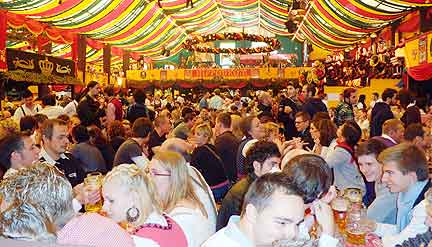
It was noon, and the revelers had been drinking since 10 a.m. Some stumbled along, supported by friends. Others sat on the ground, heads in hands. No wonder: beer is sold by the liter mug and the whole idea is to drink as much as possible. The gutters ran with pee and puke.

Right away Bob and I noticed “suspects”—probably pickpockets, in our opinion—scanning the crowds. Time was short though; Bob was supposed to steal from sober partiers. No time for thiefhunting. We stood on a grassy slope among the sick and sleeping, the singing, the happy, the tired. A man lay sprawled face down at our feet, right arm extended clutching his cellphone like a torch, like a fallen statue.
“Let me have this one,” our producer said with a wink. He bent and slipped the phone from the man’s grip. Too easy. Unable to rouse the plastered guy, we finally stuffed the phone into his back pocket and considered it safer than it had been.
Bob and I surveyed the mob, looking for likely marks. We had a to-do list of items to steal; and we hoped for victims who’d be good for television. We didn’t want the type who’d punch Bob in the face if they caught on— granted, though, they’d be great for television.
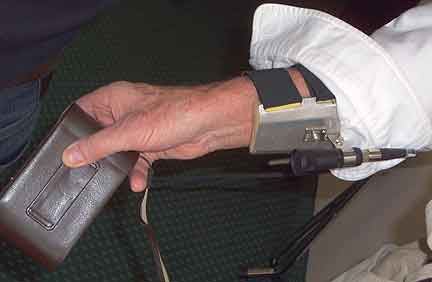
In preparation for this challenge, our special cameraman, Frank Jeroschinsky, built a fancy “wrist-cam,” a lipstick camera he strapped to Bob’s arm with a cord that ran up Bob’s sleeve and into a backpack, where the recording device was stashed. The device was meant to capture the steal as Bob’s hand entered a purse or pocket. We didn’t have the heart to tell Frank how many cameramen before him had rigged similar set-ups. Bob just ran through the tests and trials and Frank saw for himself the disappointing results.
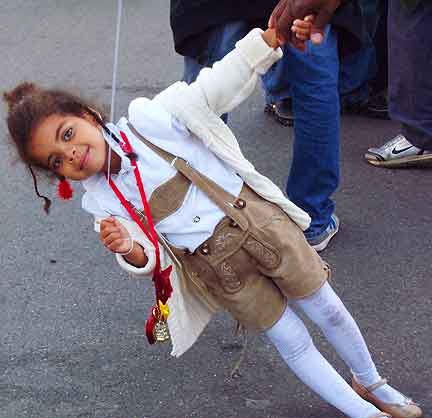
Interesting to watch the regimented Germans let loose. As we mingled, futilely trying to blend in, we saw heaps of humanity crumpled on the ground, and those attending to them. A policeman tried to rouse a man splayed on a sidewalk. A first aid team huddled around an unconscious body. Friends supported friends as best they could.
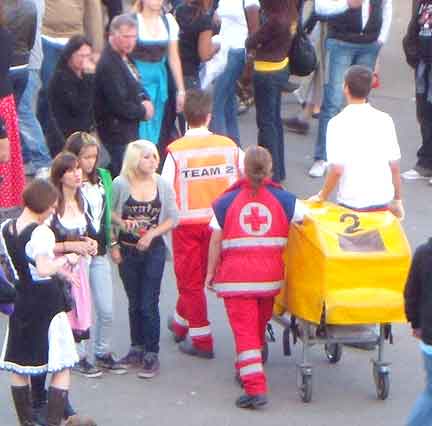
Before Oktoberfest was over, Munich police had arrested more than 80 pickpockets. They had come from many surrounding countries, as expected. A more inviting gathering for thieves cannot be imagined. Celebrants with traveling cash flooded in from all across Europe and beyond. Flocks of Russians had flown in. Grassy parking lots were lined with hundreds of buses from Italy, Czech Republic, Spain, and more.
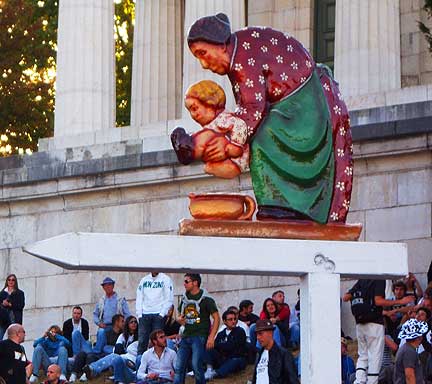
Expecting a flood of pickpockets from Romania, authorities had also imported a special team of Romanian police.

What struck me among all the drunk and sick and out-of-control partiers was the overall peacefulness. In two long days I didn’t see a single fight, didn’t hear shouts, insults, or curses.

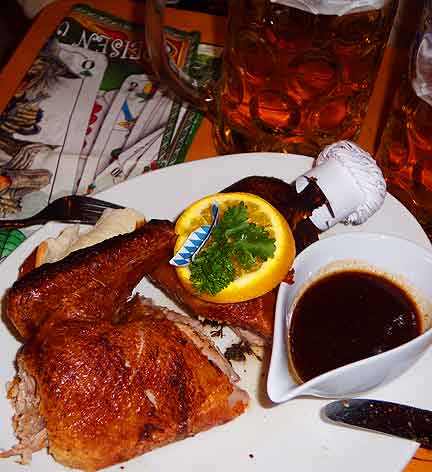

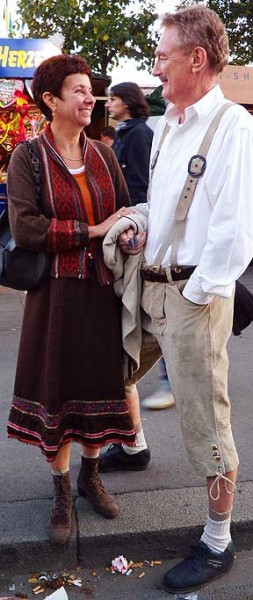
RTL Television’s Extra segment was broadcast the evening of October 5 to a 27% audience share. 17% has been their maximum, so it’s considered a huge success. Although it’s not officially online, we expect to get a copy of the piece shortly. Perhaps we’ll upload it. If so, I’ll link it here.
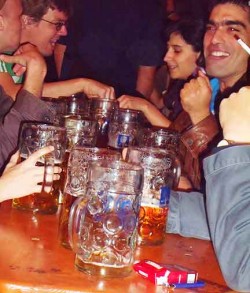
Social engineering—is it time to curtail trust?

A couple of scumbags have been casing neighborhoods in Las Vegas, preying on elders. They chat up residents, pretending to be a former resident or a relative of a neighbor. They ask questions and gather information. When they’ve learned enough about someone elderly on the street, they approach the senior armed with facts and trivia—enough to garner the senior’s confidence. In every case, the bottom line is that they need money. The money’s not for them, of course; it’s for one of the neighbors, who is in a costly (fictitious) emergency situation, something medical, or maybe legal. The two solicitors are merely good samaritans.

Classic social engineering. This pair of con artists has bilked 19 known victims in Las Vegas, all over age 73, out of tens of thousands of dollars. It’s likely that they’re connected to similar incidents in Arizona and California; it’s probable that many other victims exist, unaware they’ve been scammed, or embarrassed to come forward.
It sounds like a couple on a crime spree, but it’s much more than that. From our intensive workshop with NABI, we know that this is organized crime. Assistant district attorney Scott Mitchell called them gypsies. Most likely, they are members of one of the families called Travelers. These families move from town to town as they pull their scams, often on the elderly. They have a large repertoire, including sweetheart swindles, pigeon drops, fake lotto schemes, and home repair. Many of these are combined with plain old burglary.
The Travelers are organized crime families. So organized, that when they find a particularly gullible victim, they pass his info to the next family members scheduled to roll through that town. Then, even if the victim realizes that the roof repair or driveway resurfacing job was shoddy, he won’t recognize the brother or cousin who offers to paint the house with leftover paint from a job down the street, or the sister collecting funds for the sick man a few houses down.

These fraudsters go to extremes in order to impersonate a good samaritan. Through social engineering, they manipulate their victims with a realistic story, bamboozle them with bullshit, dupe them, and exploit them. It always ends one way: the victims’ money in the Travelers’ hands. The two pictured above go so far as to drive their victims to their banks or ATMs.
These two have been arrested and are being held, as of this moment, at Clark County Detention Center in Las Vegas. Travelers are known to have lawyers on retainer and bail money at the ready. Although the two are considered flight risks, they may bail out on the condition that they wear GPS ankle devices.
Actually, that’s not likely. I just spoke with Lieutenant Bob Sebby, Las Vegas Metro, who said that 15 additional victims have been confirmed. Metro is asking other victims to come forward.
The cozy-up steal
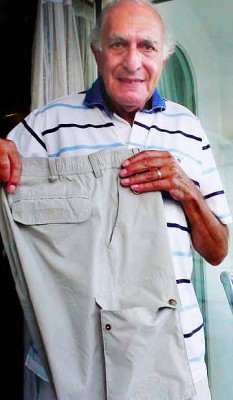
Sandy and Frances thought little of the gaggle of girls who flopped onto the bench they were resting on. There were more girls than could fit on the bench: half a dozen or more. They were pretty, 15-16-year-olds and with them was an adult woman. Their teacher, perhaps, Frances thought.
The girls cozied up to Sandy, making room for one more to squeeze onto the bench. They wiggled and squirmed, like impatient students in class, while the woman spoke to them. Sandy and Frances didn’t understand the language they spoke.
The couple didn’t notice that all the other benches were empty. They didn’t wonder why this gang, or “class,” had to crowd onto their bench. They were not the least suspicious of the girls.
“Why don’t we move so they can all fit,” Sandy said after a couple of minutes. He and Frances settled on the next bench.
“We needn’t have bothered,” he said, watching as the group immediately left the bench and the area.
Londoners Sandy and Frances had just flown into Barcelona to take a cruise. They were too early to board, but it was a gorgeous, sunny afternoon and they didn’t mind waiting the ten minutes before the gangway opened.
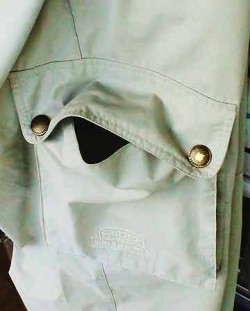
Soon they were in their stateroom, unpacking. Sandy opened a drawer to put away his wallet and, of course, you know: his pocket was empty. He’d had it in the cargo pocket of his pants, “secured” with two buttons. He told us how he went cold all over. How he checked and rechecked his pocket, not believing his wallet was really gone. But from the first instant, he knew exactly what had happened.
Are you groaning? Not another Barcelona story, please! I’m afraid so.
Sandy told us over and over how stupid he felt for letting it happen. There was a lot of money in the wallet, but his insurance would replace it. He just felt like an idiot. Although I’ve never heard of this particular technique, I assured him that this gang was well-practiced in the art of portraying innocence. They knew exactly how to behave, how to avoid rousing suspicion.
The thief hadn’t even unbuttoned the pocket. She didn’t need to. The gap between the two buttons was large enough for a slim hand and a wallet.
They got thousands of British pounds. I don’t think they’ll work for a while. We’re all safe from this gang, at least for the next week or two.
Muscat souk
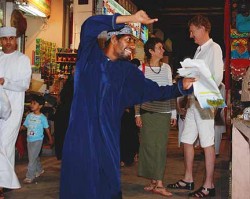
There was plenty of clowning around in Muscat last week. In the souk, Bob put a camera on a tripod and walked away from it. We wouldn’t do that in most of the places we visit, including other countries under strict Sharia law. But this Omani souk, crowded with locals, had a comfortable, family atmosphere.
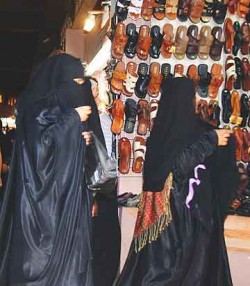
Bob held a remote and snapped a few test shots. Without warning, this happy man danced into our shot. These two women also stepped in front of the shutter. A large number of women were completely covered, not even eye slits in their black face veils. Some wore sunglasses on top of full face veils.
I understand that Muslim women must cover themselves, but in 110 degree heat, their multiple layers must be torture. Bob was drenched in a loose, light-as-air shirt. I was hot in my two skimpy layers.

The local women wore long pants and long sleeves under their abayas and veils, and some wore scarves, too. Omani women wear very long abayas, “taller than themselves,” a custom which dates back to their Bedouin days, when even a woman’s footprints in the sand should not be seen. The long gown gracefully erased them. Omani men wear a tassel at the neck of their dishdasha, which is drenched in scent to enhance male-to-male hugs.

Bob plopped down among a group of men who happily gave permission to be photographed, despite their dubious expressions here. Turns out they were right to doubt the intentions of the tall skinny Western man with unseemly bare legs.
It wasn’t long before Bob had the watch of one of the men. After a suitable moment of laughter from the others, Bob returned the watch and was admonished with a smile.

I’m happy to report that Bob left town with both hands intact.
At the Muscat airport, we had to sit in the lobby an hour, waiting for check-in to begin. We found chairs in a “family section,” which was filled mostly with women (about 30) and small children, and a few couples. About half the women were fully covered; meaning, not even eyes showing. The rest were bare-faced or only eyes showing, plus one Indian in a sari, and one Muslim nanny in an ordinary headscarf. I watched the little children run around, ages 2 to 6, and wondered how they identified their mothers. The women had no peripheral vision; I wondered if they can even see to step off a curb.
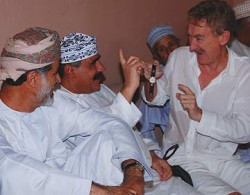
High-end shops are popular in the Arab world. Women buy the latest Prada and Versace outfits, then cover them with abayas. At social gatherings, the women gather in a private room and remove their abayas.
A false sense of security
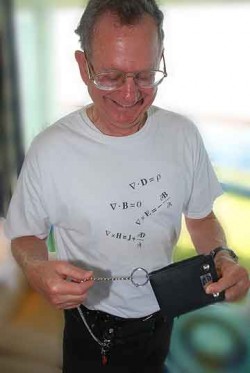
To a pair of pickpockets in London, Lionel Skidmore looked like an easy target. The thieves mounted a bus, then immediately turned and got off, pushing past Lionel, who was just getting on. Checking and noticing that his wallet was gone, Lionel ran after the perps and demanded the return of his wallet. One thief took off. The other pointed to the ground, where the wallet had been dropped. Nothing was missing from it.
The novel part of this story, to me, is that Lionel’s wallet was deep in his pocket, attached to a chain. Granted, the metal ring attachment was a weak one, according to Lionel, but the pickpockets didn’t know that when they decided to take the wallet.
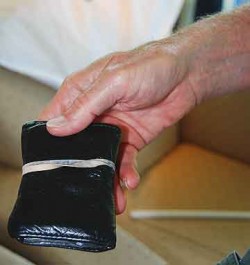
This reminds me that there are no rules in pickpocketing; or rather, that there are, but they’re all bustable. For example, how many of you have heard that wrapping a rubber band around your wallet makes it harder to steal? Hands up. Right, I thought so. No, the thieves tell us—a rubber band makes their job easier. It gives them something to grip, and it keeps the wallet closed, preventing corners from catching in the extraction.
It’s easy to think that a wallet on a chain is safe (no comment on the fashion statement it makes). You’d think that pickpockets would move on to an unchained wallet—the vast majority of them. Turns out that the chain makes a handy little extraction tool. And according to Lionel, a long-time chain-user, most chains are cheap, Chinese-made metal with weak attachment rings.
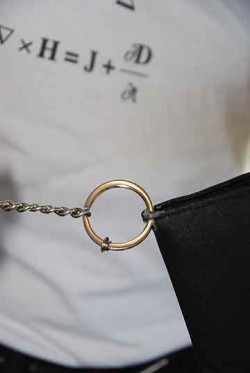
Lionel showed us his new, heavy-weight chain-attachment-ring. Looks strong! But it’s threaded through a thin layer of worn, flimsy leather at the corner of his wallet. Easily the weakest link in a weak system. A useless grommet, freed from the loose leather, slides around the ring. Lionel feels his chained wallet is secure. His (false) sense of security allows him to travel the world with confidence.
![]()

